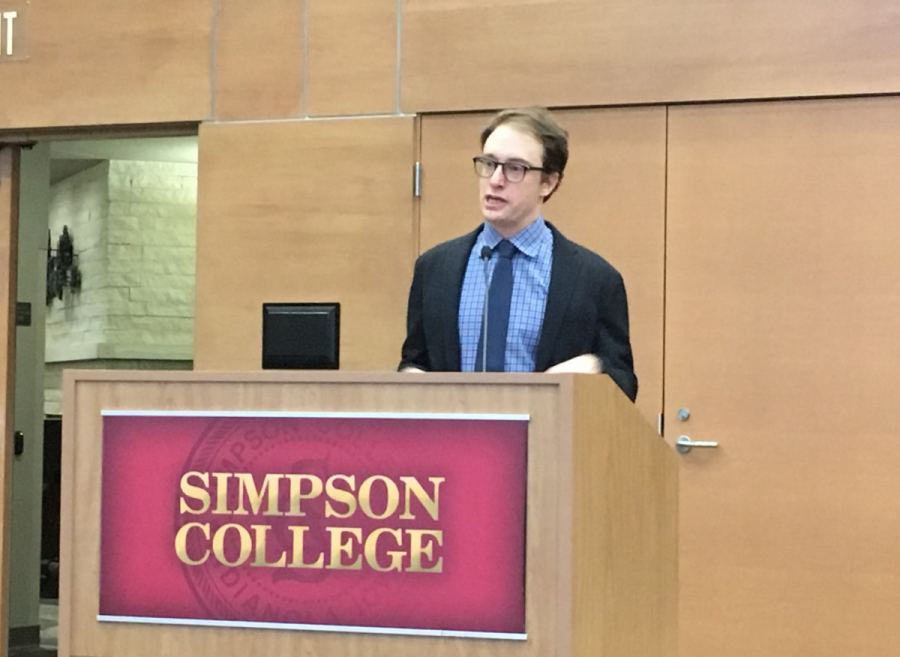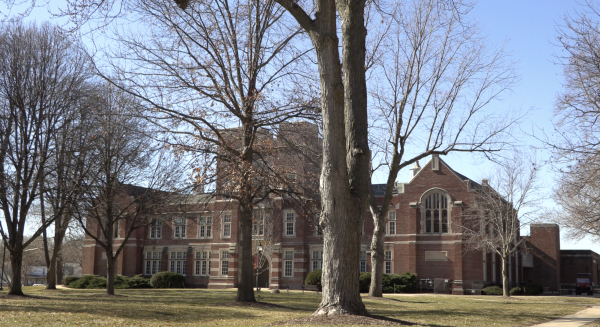Gabriel Sherman explains the rise of Trump
April 18, 2019
Vanity Fair special correspondent Gabriel Sherman spoke about his book “The Loudest Voice in the Room” in Hubbell Hall on Monday. His book was the culmination of years researching Roger Ailes, the late former CEO of Fox News, and how his news network influenced modern politics.
Professor of philosophy John Pauley, who came to know Sherman during the author’s research, invited Sherman to speak to campus.
Sherman began by speaking about the change in U.S. politics after Donald Trump was elected president.
“No matter what your politics are, Republican, Democrat, Independant, apolitical, I think we can all agree that having Donald Trump as president of the United States is a big departure from the way Americans used to elect their presidents,” Sherman said.
He said that although Trump was known as a reality TV star, his election was serious.
“Donald Trump did not get elected in a vacuum. He was actually the product of a media and political culture that has been 50 years in the making,” Sherman said.
He also explained how Ailes, the subject of Sherman’s research, played a role in the rise of conservative media.
Sherman said Ailes began his political career on Richard Nixon’s 1968 presidential campaign, serving as Nixon’s TV adviser. It was through Ailes’ coaching that Nixon improved his TV image and was elected president that year.
After Nixon eventually resigned after continuous coverage of the Watergate scandal, Sherman said conservative leaders wanted to cultivate their own media environment.
“We have a media culture where, if you are a Democrat, you are firmly convinced that Trump colluded with Russia. And if you’re a Republican, and you only get your news for Fox or Rush Limbaugh, to you this is all a hoax and a witch hunt,” Sherman said.
Sherman believes the Watergate scandal is what ultimately caused an interest in a conservative media format.
“And I think this is, of everything, probably the clearest example of how conservatives wanted to reshape America in their partisan image if there was going to be a presidential scandal on the level of Watergate, that they would have their own to give their own version of events,” Sherman said.
He said this would allow both sides to share their perspective on their issues. Sherman also explained how Simpson professor of philos
“They tried to create their own news network. And John Pauley’s father, Robert Pauley, was a very prominent and successful executive in New York City,” Sherman said. “And he had an idea for a conservative news network, which was groundbreaking at the time.”
After starting TVN, a conservative news network, Robert Pauley hired Ailes to serve as the news director. Although this news network failed, it laid the groundwork for Fox News.
“Roger really had both created, in a general sense, the culture that produced Donald Trump, but then in a very literal and specific sense, he gave him a prime venue on his network to connect with primary voters,” Sherman said.
Sherman said many Republican primary voters now receive their news mainly from Fox News.
Sherman later opened the conversation up for questions from the audience. One student asked how Sherman went about researching Ailes after he attempted to keep others from speaking to him.
Sherman explained his research involved interviewing about 600 people, including current and former employees of Fox News.
“The research was similar to how someone would do about doing a biography of someone who’s dead,” he said. “It just made me want to pull the curtain back a little bit. Journalism is actually not a glamorous position.”
Senior Danielle Bates found a new perspective from Sherman’s lecture.
“Gabriel Sherman’s lecture really opened my eyes to the behind the scene aspects of partisan media,” Bates said. “I’ve always known that Fox News is the main, right-leaning media source, but it was interesting getting more of an insight to the life of Roger Ailes and just how much on an influence he had on politics.”
















